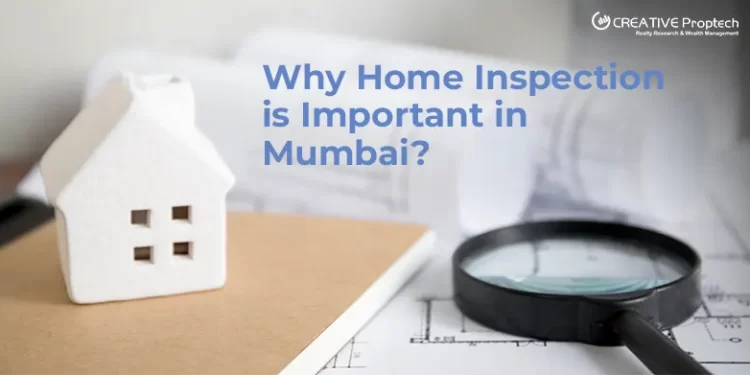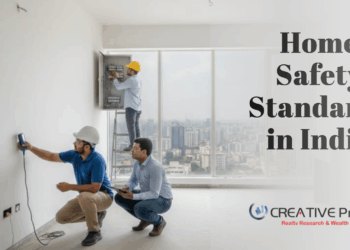In a city like Mumbai, where real estate is both a premium investment and a necessity, every square foot matters. Whether you’re purchasing a luxury apartment in South Mumbai, a compact flat in Andheri, or a resale unit in Navi Mumbai, a home inspection is an essential step—not a luxury.
Here’s why skipping a home inspection in Mumbai could lead to unexpected costs and stress in the long run.
HighRise Living and MumbaiSpecific Challenges
Mumbai’s skyline is dotted with highrises, and each of them comes with its own set of challenges. From the corrosive effects of salt-laden sea air on Marine Drive’s window frames to inconsistent water pressure on the top floors of Powai’s skyscrapers, adapting to the realities of vertical living in Mumbai requires a keen understanding of these localized challenges.
Other common issues in Mumbai homes include:
- Leakage from adjacent flats or upper floors
- Poor waterproofing against monsoon rains
- Noise insulation problems due to thin partitions
- Load distribution concerns in older buildings
These factors often go unnoticed in a brief site visit but are picked up during a professional home inspection.

Critical Areas Assessed During a Mumbai Home Inspection
A typical home inspection covers multiple critical systems, including:
- Civil Work: Tile alignment, cracks, plastering issues
- Plumbing: Water pressure, pipe integrity, bathroom drainage
- Electrical: Earthing, MCB function, plug polarity, wiring checks
- Structural Integrity: Window frame rust, wall cracks, false ceiling inspection
- Ventilation & Drainage: Adequate airflow, kitchen exhaust, balcony drainage
In Mumbai, especially in coastal and monsoon heavy zones, inspectors also evaluate external wall treatments and terrace sealing.
Why Resale Properties Need a Closer Look
Mumbai has a high number of resale transactions, especially in established localities like Bandra, Chembur, and Borivali. These homes may come with hidden surprises:
- Faded waterproofing layers causing seepage
- Pest infestations in aging wooden furniture or frames
- Overloaded electrical systems
- Cracks behind repainted walls
Unlike new constructions, resale homes rarely come with warranties or postsale fixes. A home inspection arms buyers with facts that can influence pricing and future maintenance planning.
What You Might Miss Without a Professional Eye
It’s common in Mumbai to take a builder’s assurance or do a basic walkthrough. But when you’re investing in a property, this approach isn’t enough.
Professional home inspections use tools and methods like:
- Thermal imaging to detect dampness and leakages
- Laser levels for slope and alignment checks
- Electrical testers for load and polarity checks
- Drainage flow checks with noninvasive methods
These detailed reports give buyers the confidence that their investment is structurally and functionally sound.
Timing Matters: When to Inspect Your Property
For new apartments, get the inspection done:
- Before taking possession
- Before making final payments to the builder
For resale flats, schedule it:
- Before signing the agreement or registration
- If any renovation work is planned
This timing ensures you’re in a position to negotiate or ask for repairs without legal complications.
Use Inspection Findings to Strengthen Your Deal
Mumbai real estate is expensive, and every rupee saved matters. A detailed home inspection report gives you strong ground to:
- Ask for prepossession rectifications
- Negotiate the cost of repairs with the seller
- Justify pricing adjustments with documented issues
In competitive markets like Mumbai, this can lead to significant savings or better value for your money.
Flexibility to schedule inspections at your convenience
Many Mumbai buyers are NRIs or professionals with limited time. They can’t supervise construction or evaluate a resale unit thoroughly.
A home inspection:
- Offers an unbiased, expert perspective
- Can be arranged even in your absence
- Ensures your money is not going into a repairprone property
Even if you’re buying remotely, you’ll receive a full report with photos and recommendations, making your decision easier and stressfree.
Detect minor issues before they evolve into costly repairs
A well inspected home will require fewer repairs over time. Especially in Mumbai where dampness, salt air, and monsoons are consistent stressors, inspections help:
- Maintain structural durability
- Avoid expensive emergency repairs
- Preserve resale value in the future
Regular home inspections can serve as preventive maintenance, saving longterm costs and headaches.
Conclusion
Although home inspections are not mandatory by law in India, they play a vital role in making informed real estate decisions. A detailed inspection can reveal hidden problems, verify adherence to safety standards, and provide critical insights that safeguard your investment and help avoid costly repairs down the line.
For buyers, a professional inspection ensures the property is safe, well-built, and a sound investment. For sellers, it highlights any issues that could affect the sale price or marketability, offering the chance to make necessary repairs before listing, ultimately leading to a smoother transaction.
FAQ
1. Is a home inspection necessary for a new flat in Mumbai?
Yes. Even new constructions can have undetected flaws due to rushed deadlines or lowquality workmanship. A home inspection catches these issues early.
2. What factors influence the cost of a home inspection in Mumbai?
The price depends on the size of the flat, age of the building, location, and the level of detail required. It’s best to enquire or request a personalized quote.
3. Can I do a home inspection by myself?
Basic visual checks help, but a professional inspection uses advanced tools and expertise to find hidden defects and system failures that you may miss.
4. What is the right time to get a home inspection done?
Before possession, final payment, or sale deed registration. This ensures you can act on the findings in a timely and legal manner.
5. What if the inspection finds major issues?
You can request repairs, ask for a price reduction, or even reconsider the deal based on the severity of the issues documented in the report.






